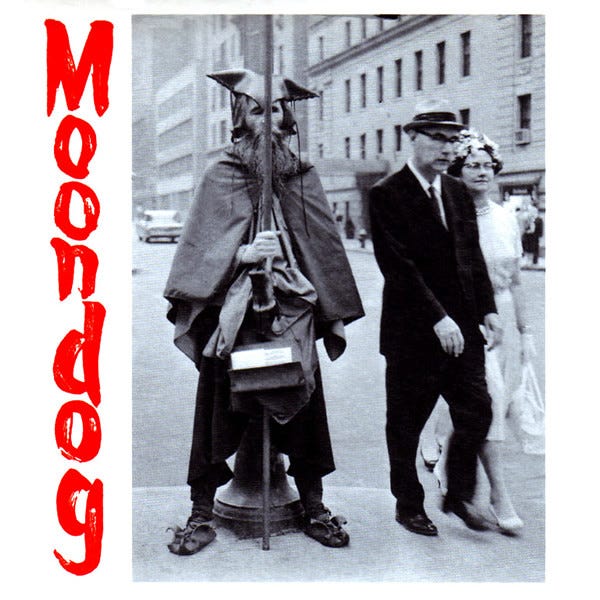Moondog – The Viking’s Voyage
Louis Hardin wore many hats: composer, poet, street musician and in the words of composers Phillip Glass and Steve Reich, “the founder of minimalism”. But Hardin’s favorite hat was a leather Viking helmet complete with horns. He could be seen, in full Viking costume, playing music on the streets of Manhattan from the late 1940s through the 1970s. Known in New York as the Viking of Sixth Avenue, he was better known in the music world as Moondog.
Born in 1916 in Marysville Kansas, Moondog lost his sight in an explosives related accident at age seventeen. Upon this unfortunate incident, he was placed in the Iowa School for the Blind, where he received a far-reaching musical education that he later said would have been otherwise beyond his means.
By the mid 1940s, Moondog had made his way to New York, where he became a street musician playing his compositions on flute, drums and various handmade percussion instruments of his own creation. In 1949, producer Gabriel Oller recorded Moondog’s first records for the SMC-Pro-Arte label – a label that otherwise specialized in Spanish music for Oller’s Spanish Music Center record store. This commenced a long series of recordings for various labels (including Moondog’s own) that would continue for decades.
As a result of recording for a multitude of small, independent, vanity and occasionally major labels, much of Moondog’s music has been unavailable to anyone not fortunate enough to buy copies when they were originally released. Many of these extremely obscure records have seemingly been endlessly re-packaged over the last twenty years, but likely the best collection is “Moondog – The Viking of Sixth Avenue” (LP or CD on the Honest Jons label) . Though now seemingly out of print, copies do turn up fairly regularly online. You can also hear the album on You Tube (linked below).
While relying on percussive rhythms for much of his composing, Moondog’s music shows a wide range of influences. “Theme and Variation” is quintessential Moondog utilizing a repeated percussion rhythm with flute that is gradually augmented by orchestral instruments that provide a contrapuntal melody to the initial rhythmic pattern. Native American music was a prime influence on Moondog from an early age and much of his music combines this structure of Native American dance rhythms with European orchestral forms. Other tracks like “Moondog Symphony No. 1 -Timberwolf”, “Rimshot” and “Snaketime Rhythm” dispense with the orchestra altogether and serve as explorations of Native American style percussion rhythms alone.
“Lament 1 – Bird’s Lament”, written in the 1950s for his friend Charlie Parker, is probably Moondog’s most famous piece. He loved saxophones and created an orchestral piece with repeating phrases for sax that anticipate the minimalist compositions of Phillip Glass thirty years later.
Other pieces such as “Be a Hobo and Go With Me” showcase his poetry while “Enough About Human Rights” combines his rhythmic song forms with a chorus (Moondog himself overdubbed multiple times) chanting about rights that never otherwise got discussed (“What about plant rights? What about forth-rights?”)
The advanced nature of both Moondog’s composition and the recordings themselves is hard to comprehend today, but in the early 1950s, these were quite unusual. His blending of Native American rhythms and exotic percussion instruments with jazz and orchestral forms anticipates the whole idea of “world music” by forty years. The recording techniques utilized to record these 78 rpm singles were remarkably advanced for independent records at the time. The overdubbing of voices as well as instruments and sound effects provide a much richer audio experience than listeners were used to and in fact rival film audio in their complexity.
Many of his compositions could have been used for film. His music is extremely evocative of moods and his songs generally last between one and three minutes - making them perfect for film scores requiring incidental musical punctuation. Sadly, Moondog never did write a film score, but his work has been heard in a number of films as well as commercials – most notably “Bird’s Lament” which seems to turn up regularly in independent films and TV commercials.
After going to Frankfurt for a concert in 1974, Moondog settled in Germany with Ilona Goebel and her family where he continued to compose, record and give concerts until the mid 1990s.
Though the Viking of Sixth Avenue no longer walks among us, his music remains timeless.
-- Thank you for checking out Beyond Bop. Free subscribe to be notified of future columns.




